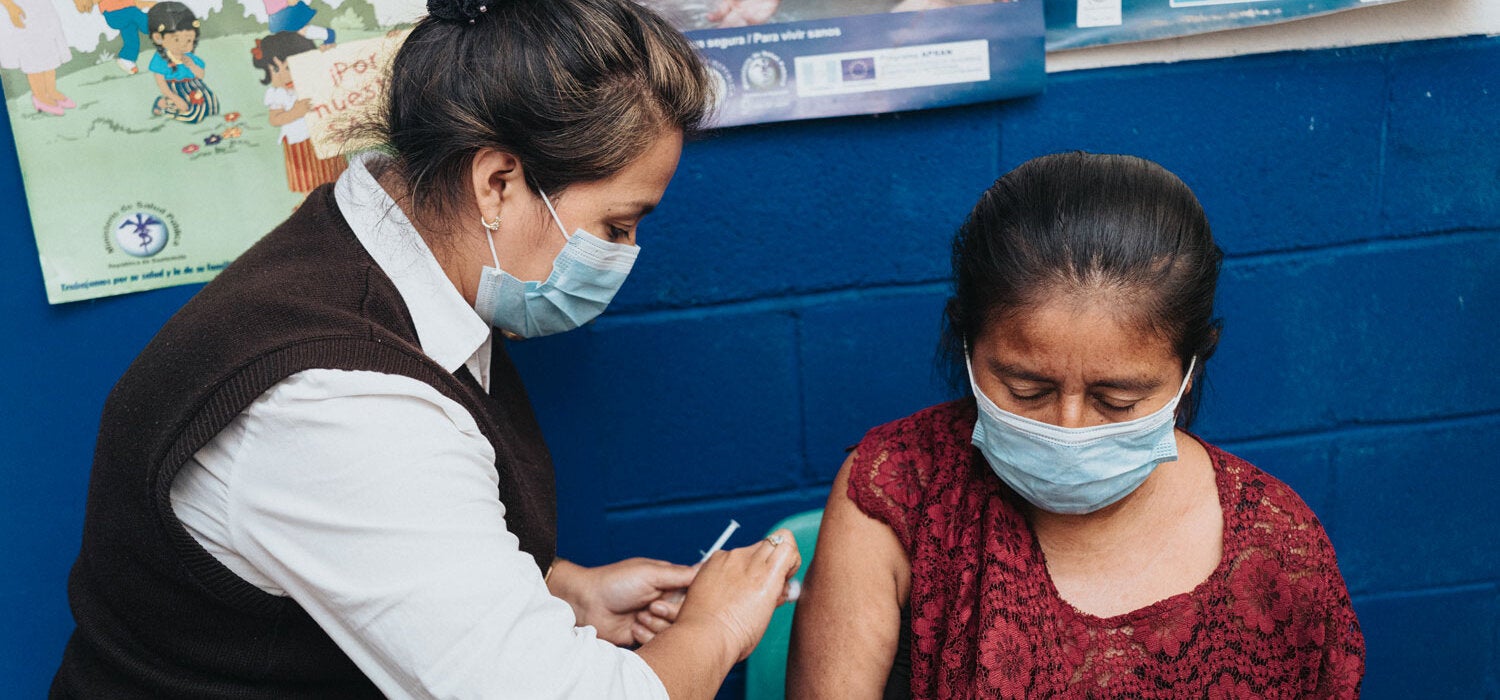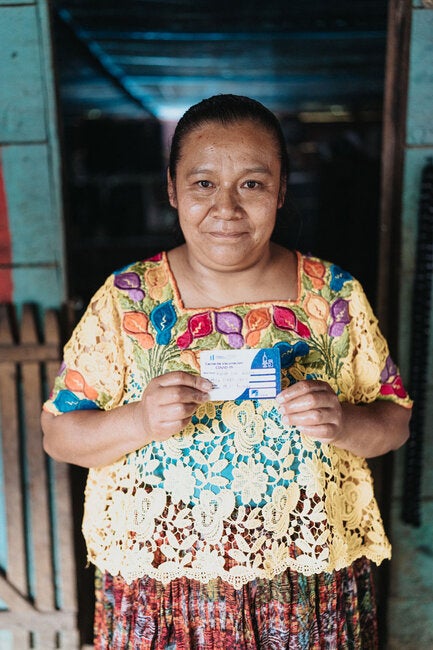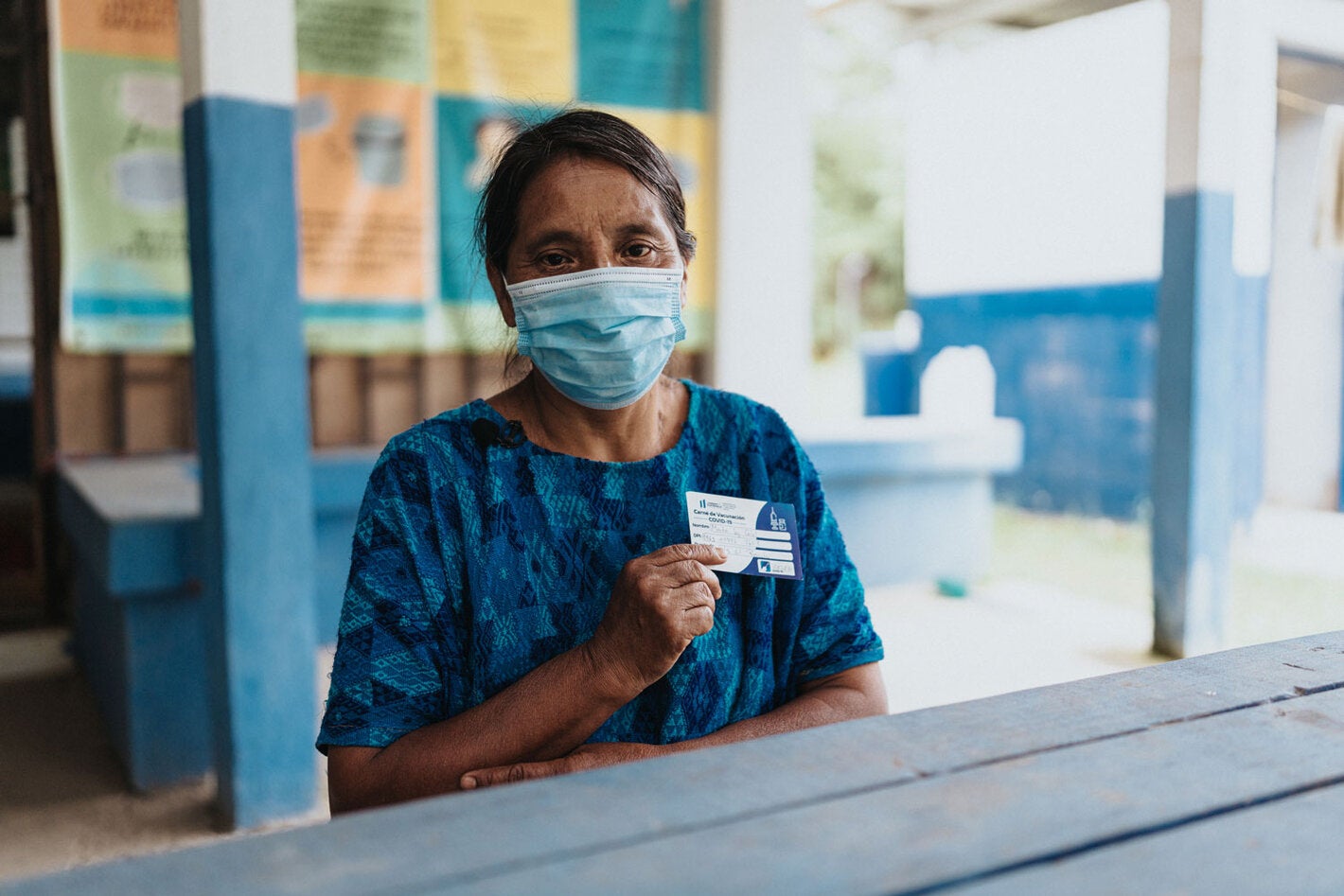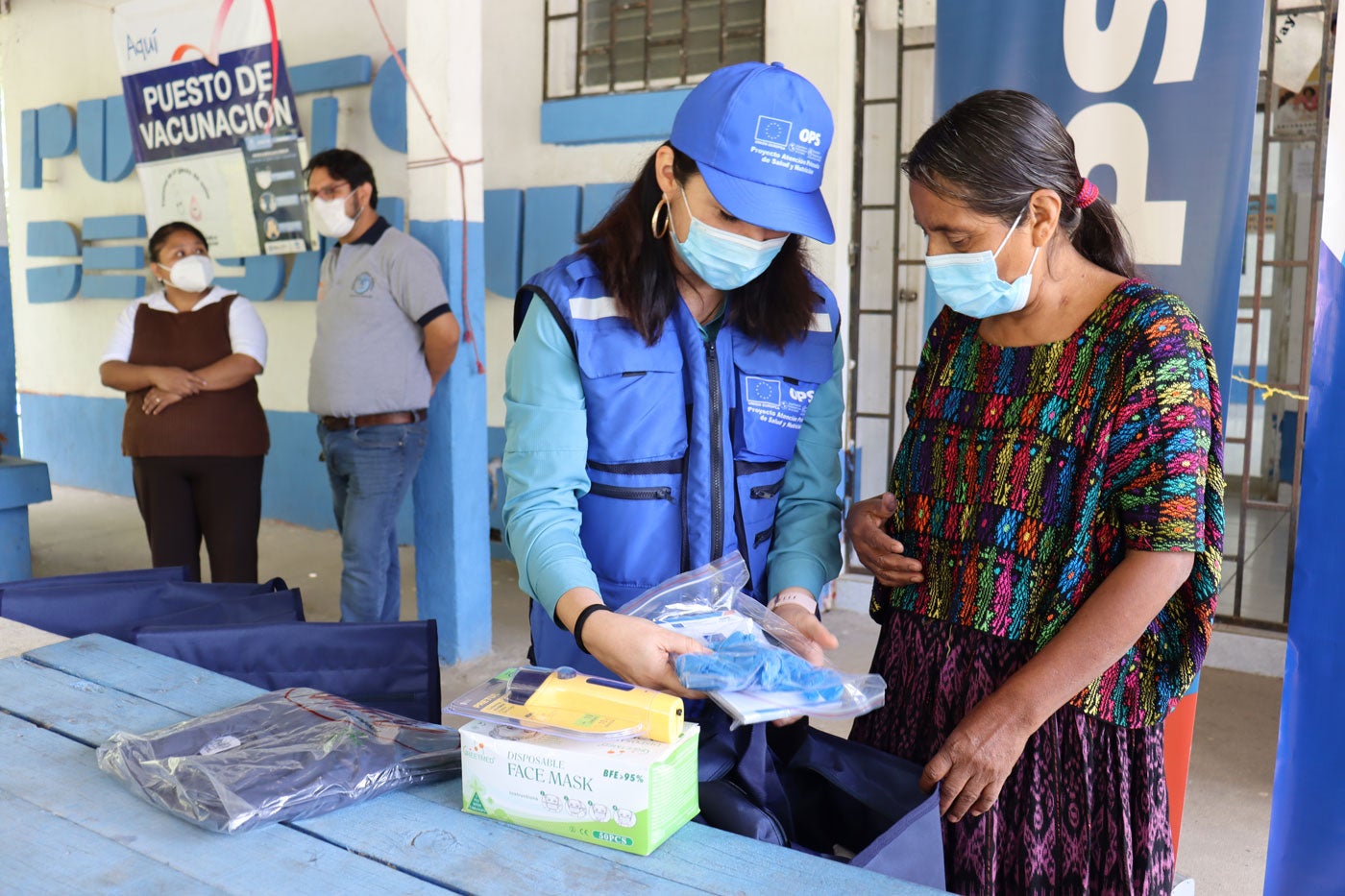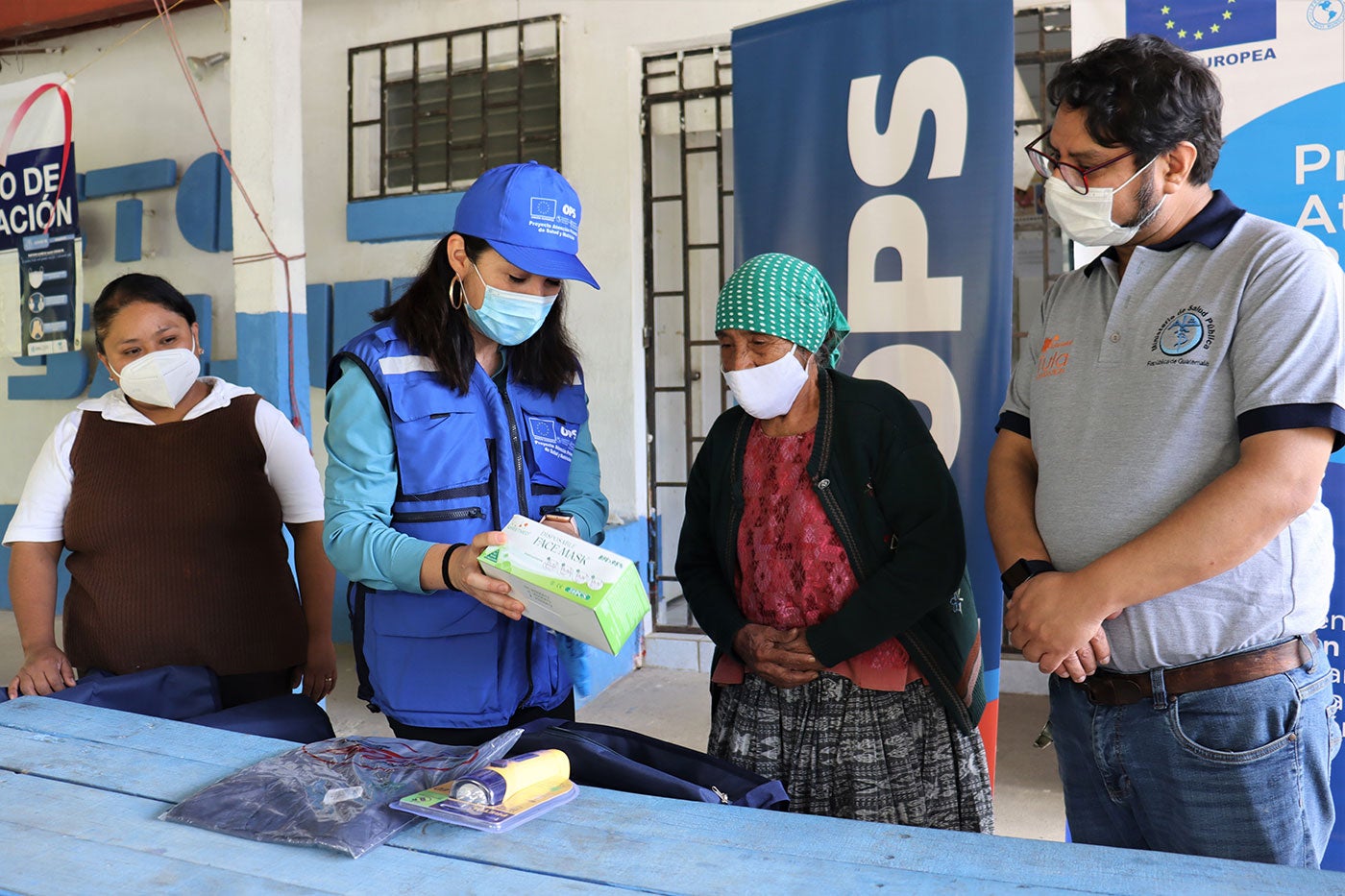3 June 2022
Guatemala, like many countries around the world, was flooded with rumors when COVID-19 vaccination started. A strategy to counter 21st century disinformation was found paradoxically in an old tradition: the comadronas or traditional midwives, who are revered in Guatemala as keepers of ancestral medical knowledge, and who support women throughout pregnancy, delivery and motherhood.
The practical and spiritual guidance from comadronas is a mainstay of indigenous families, who make up over 40 percent of the country’s population and often live in poverty, far away from health clinics.
It is said that comadronas are born with their talent. Due to their high standing in traditional Mayan society – and because their home visits were often the only attention pregnant women received during pandemic lockdowns – the Guatemalan Ministry of Public Health and the Pan American Health Organization (PAHO) sought them out as ideal messengers to fight disinformation.
Over the last decades, Guatemala has persistently shown one of the highest maternal mortality rates in Latin America and the pandemic posed an additional challenge: according to the Guatemalan Ministry of Health, COVID-19 was the main cause of maternal deaths in 2021, making vaccination efforts imperative.
As part of public health policies to decrease the death toll, the Ministry has made a concerted effort to include and recognize the work done by comadronas by providing basic training to help them identify high-risk pregnancies and be able rush mothers to health centers when necessary.
When vaccination started, the Ministry established the comadronas as a priority group, and after receiving their protective doses, they went out to their communities to spread the word about the efficacy and safety of vaccines.
Matilde Rax Gualim, 44, who has been a comadrona for half her life, takes a no-fuss approach towards the vaccination campaign: “I recommend the COVID-19 vaccine to pregnant women the same way I recommend folic acid and vitamins: for the good of their health and their babies,” she said from El Rancho, an indigenous community in the department of Alta Verapaz, 254 kms from the capital.
Gualim’s neighbors tried to dissuade her from getting the shot, “but I went to the health clinic and decided to get vaccinated. Everyone asked me to show my arm, and I did, pointing that the vaccine didn’t do any harm to it,” she added.
“I try to encourage my community to get vaccinated. More than anything we need a return to normal life and the vaccines can help us with that,” said Marta Laj Calel, 58, who has been a comadrona for 20 years. The rumors over the side effects of the vaccine frightened her at first, but she didn’t pay much attention to them, as she had seen that most of the nurses at the local health clinic had been vaccinated.
Marta Laj Calel, with her proof of vaccination
The cooperation between Mayan midwives and health centers helps to improve health in remote areas, according to Dr. Dilys Walker, Professor, Reproductive Services, School of Medicine, University of California, San Francisco (UCSF).
“In the past several years, there has been a big push to integrate comadronas into the Guatemalan health system to help in the delivery of babies in facilities,” she said.
This is a far cry from previous years. Dr. Walker recalled of her time as an obstetrician, when she trained comadronas in simulations for acute childbirth emergencies. “Back then -when they traveled to health clinics- it was more likely to see comadronas cleaning up after a birth, rather than assisting with one,” she added.
There are over 23,000 comadronas registered with the Guatemalan Ministry of Public Health, according to Nim Alaxik, a national non-governmental organization dedicated to oversee their wellbeing.
The indigenous midwives now receive an official identity card linking them to the Ministry and are eligible for regular training. But they are not part of the Ministry payroll, and finding ways to support their work is still a challenge, said Dr. Jose Milton Guzman, a medical doctor and anthropologist at the PAHO office in Guatemala.
In El Rancho, during the worst days of the pandemic, PAHO, with the support of the European Union, provided comadronas with kits that included masks, sanitizers as well as flashlights and raincoats to help them continue their work under all circumstances.
In order to address the language and cultural differences, the Ministry of Public Health also produced a vaccination guide and translated it into Mayan languages, as well as Garifuna and Xinca, with support from PAHO. Radio spots in different languages were also broadcast to support the dissemination of factual vaccine information in vulnerable communities, a strategy sponsored by the European Union, among others.
The collaborative effort to support measures to boost vaccination rates in Guatemala continue. Vaccination rates in the country have yet to reach the target set by the World Health Organization of providing two doses to 70% of the world population by mid-2022. To date, only 34.1 percent of the population has been fully vaccinated against COVID-19. Over 18,000 deaths due to the disease have been registered in the country up to May 2022.
The comadronas will continue to play an important role in the health and well-being of mothers in Guatemala. Their support in the COVID-19 vaccination effort shows that culturally-sensitive approaches to health are crucial - Comadronas are a vital bridge to health care in Guatemala, improving care for the most vulnerable while keeping ancestral knowledge and traditions alive.
This work has been recognized with the establishment of a National Comadrona Day, to be celebrated every year on May 19, giving these champions of maternal health hopes for greater recognition.
PAHO is working with health authorities, local governments and communities to improve equitable access to COVID-19 vaccines across the Americas. With funds from the Government of Canada and other key partners, PAHO is supporting projects and interventions to take vaccines to indigenous peoples, migrants, hard-to-reach communities and other populations in situations of vulnerability, while increasing the capacities of local health systems and fighting the infodemic.

